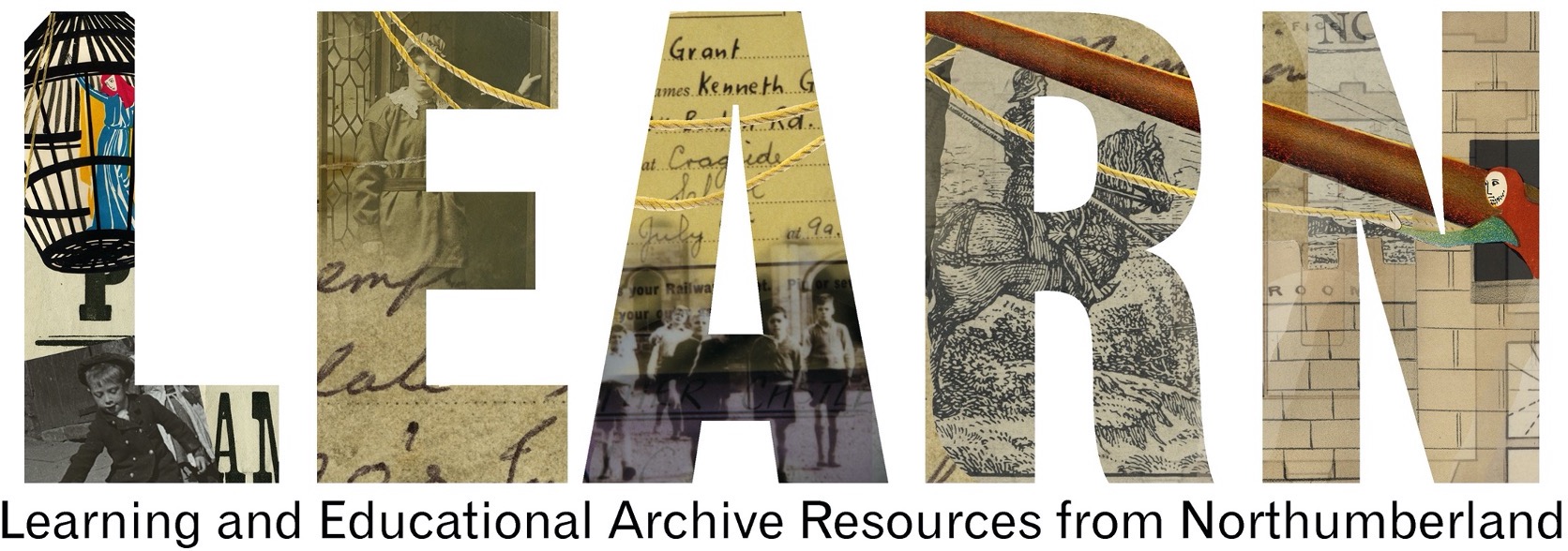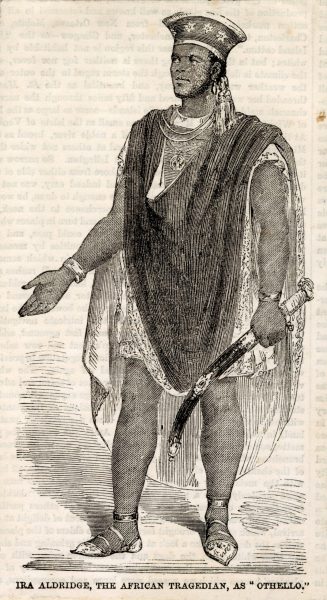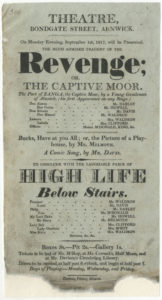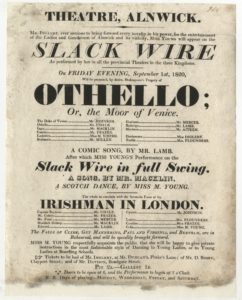Picture of Ira Aldridge in Othello
Costume, Mid-1800s
Reference: SANT BEQ/04/01/38A
Suggested age groups: KS3, KS4, Lifelong Learners
Subject areas: Black Presnce and Culture
CONTEXT
Ira Aldridge was born in New York city on 24 July 1807. Ira’s father was Reverend Daniel Aldridge. Ira attended New York’s African Free School, which the New York Manumission* Society established in 1787 to provide an education for the children of formerly enslaved people.
At the age of about 17-18 Ira set out for England to become an actor. He worked as a steward aboard a ship to earn his passage to Liverpool. Ira first appeared on the London stage in 1825 at the Royal Coburg Theatre (now the Old Vic). For a number of years, he tried to establish his career in the capital, but suffered a stream of racist abuse from theatre critics. This abuse reached its height in 1833, at a time when the debates about the abolition of slavery were also reaching fever pitch.
However, Ira was not to be deterred and set about touring the rest of the country, where he was very well received. Most of the rest of his life was spent touring Britain and Europe and he died on tour in Poland in 1867.
*manumission – official release from enslavement
We know that Ira Aldridge performed in Berwick in 1840, 1843 and 1849 and in Alnwick in 1843. He was incredibly popular – his performances sold out and extra dates had to be added. The Berwick Advertiser wrote articles about his performances, which have been attached here.
His most famous role was Shakespeare’s Othello – he is dressed for that role in the picture. The Berwick Advertiser said of his performance “he was perfectly master of his author’s text and meaning.” In another of their theatre columns, they described him as “the best actor of colour who ever appeared on the British stage.”
The Advertiser was keen to stress that Aldridge was not just a tragedian (an actor of tragic roles), but also a comic performer. The article of 1840 describes how Aldridge performed a song which included the names of local people, much to the amusement of the “gods” (the people high up, right at the back of the theatre in the cheapest seats).
In Aldridge’s publicity (including the Berwick Advertiser articles) he is often referred to as The African Roscius. Roscius was a famous Roman actor (alive around 126 BC – 62 BC) and often used as a representation of the best dramatic actor ever.
Roscius was born into slavery and used earnings from acting to buy his freedom. Ira Aldridge’s parents were not enslaved people, but he would have been aware of enslaved African-Americans. New York state abolished slavery in in 1817, but enslaved men and women were not freed in the state until 10 years later. Slavery was finally abolished across the United States in 1865.
According to one account, Ira Aldridge narrowly escaped being sold into slavery on his voyage to England. (See wikitree link below).
Othello “The Moor of Venice” was to become Ira Aldridge’s most famous part, but his first role on the stage was in a different play. He first appeared in “Oroonoko or The Royal Slave” an adaptation of the Aphra Behn novel by Thomas Southern. It is often credited as being the first abolitionist novel/play.
Our collections include nineteenth-century play bills for Othello (Alnwick), Oroonoko (Rothbury) and “Revenge or the Captive Moor” (Alnwick). Ira also played the title character, Zanga, in the Captive Moor at Stratford-upon-Avon in 1851.
Although Northumbrian audiences were used to seeing characters of African descent on the stage by the nineteenth-century, these characters were usually played by white actors, wearing Black make-up or “Black face”. Ira Aldridge played a number of white characters, including Richard III and Shylock while wearing white make-up.
Berwick Advertiser
29 August 1840
The African Roscius – The best proof that can be given of the meritorious and attractive nature of Mr Aldridge’s performances is, that he has drawn better audiences than could well have been expected in Berwick at this season, and has thereby been encouraged to prolong his stay for some nights longer than originally announced. Both in comic and tragic acting (but especially in the latter) he exhibited powers of a very high character, and certainly as a tragedian he has not been equalled by any performer who has appeared on the Berwick boards for many years. His bill of fare has also presented a judicious intermixture of grave and gay – not the least taking portion of the entertainment – at least with the gods – being a “new version of Jim Crow,” in which the names of a number of individuals in the town were made to figure, though certainly without their consent, yet in a way not at all calculated to give offence. A very attractive part of the entertainment remains to be mentioned in the performances on the violin by Mr Stevens, who exhibited great mastery over his instrument, and (especially for an excellent imitation of the Highland bagpipe, and other instruments) received the marked applause of the audience. Mr Aldridge repeats some of his most attractive performances tonight.
14 January 1843
The Theatre – An advertisement in our first page announces the opening of the theatre here for four nights next week, when Mr Aldridge, the African Roscius, is to appear in a series of characters, supported by a company of Comedians which, for some time, has been performing in Alnwick theatre. Mr Aldridge has on two previous occasions, appeared in Berwick, and, we have only to refer to these appearances to revive the recollection of the gratification and amusement he afforded. The diversity of characters he sustains, and the ability he displays in each, is truly astonishing. While tragedy is his favourite walk, his audiences here have been much divided in opinion as to whether he appears to most advantage in it, or in broad farce. The rich treat furnished on his last visit, by his performance in “The Virginian Mummy”, must be fresh in the recollection of many of our readers. As Mr Aldridge is about to return to his native country, we hope the public will avail themselves of this, the last, opportunity of witnessing the best actor of colour who ever appeared on the British stage.
10 March 1849
The Theatre – The African Roscius
As we anticipated in our last, Mr Aldridge made his first appearance in our Theatre on Monday. The fame of the actor had evidently gone before him, for as soon as the doors were opened the pit and gallery were filled to overflowing, and several persons could not gain admittance. As the performances proceeded the boxes also became filled. The opening piece was Othello. The part of the Moor has been played by Mr Aldridge throughout the last twenty-five years, and no one could witness his representation on Monday without being satisfied that he was perfectly mater of his author’s text and meaning, and that his performance was the result of much careful study. In no other character, however, has Mr Aldridge such a host of competitors for the palm as in that of Othello, and as in none of these have we ever discovered a perfect picture, we cannot pay Mr Aldridge a higher compliment than to say that he maintains a fair competition with them. While in some points we prefer Mr Aldridge, in others again, and these not less important, we give the preference to other tragedians. As a whole the performance will bear criticism, and afford much pleasure. Mr A was very respectably supported by the members of the regular company. Mr Somerville was very good as Iago; Mrs S played Desdemona very gracefully, which is all that is required of the performer. Mr Kirk scarcely set the character of Cassie; and Mr Marshall certainly overacted the buffoonery of Roderigo; but altogether the play was well gone through. The farce of The Padlock succeeded, and here we set no limit to our praise of Mr Aldridge’s performance of Mungo. While we cannot conceive it possible that it could be excelled, we had no idea that a character apparently so trifling could be made the medium of such amusement. It was a piece of genuine comic acting. Mr Aldridge’s benefit takes place tonight; the pieces to be performed are excellent selections, and we recommend our readers to avail themselves of this last opportunity of witnessing Ginger Blue.
ACTIVITIES
ACTIVITY 1
Background
Ira Aldridge was born in New York city on 24 July 1807. Ira’s father was Reverend Daniel Aldridge. Ira attended New York’s African Free School, which the New York Manumission* Society established in 1787 to provide an education for the children of formerly enslaved people.
At the age of about 17-18 Ira set out for England to become an actor. He worked as a steward aboard a ship to earn his passage to Liverpool. Ira first appeared on the London stage in 1825 at the Royal Coburg Theatre (now the Old Vic). For a number of years, he tried to establish his career in the capital, but suffered a stream of racist abuse from theatre critics. This abuse reached its height in 1833, at a time when the debates about the abolition of slavery were also reaching fever pitch.
However, Ira was not to be deterred and set about touring the rest of the country, where he was very well received. Most of the rest of his life was spent touring Britain and Europe and he died on tour in Poland in 1867.
SEE
See: Who was Ira Aldridge?
See: What was Ira Aldridge’s profession?
See: Was Ira Aldridge ever enslaved?
See: How did Ira Aldridge travel to England?
See: What issues did Ira Aldridge face while performing in London?
See: How was Ira Aldridge received while touring the rest of the country?
THINK
Think: Why did Ira’s career not see as much success in London as it did elsewhere in the country and across Europe?
Think: How do you think Ira won over audiences outside of London?
Think: How might debates about the abolition of slavery have impacted Ira’s career?
DO
Do: Begin by reading the newspaper reviews before reading the context to this document. What do you think the reviews are about? What are your first impressions of Ira Aldridge?
Do: Analyse the language used in the newspaper reviews. What can you infer from the language choices?
Do: Compare the newspaper reviews to each other. Are there any recurring words or themes used in each? Are there any that stand out as giving a different message or impression?
Do: Look at the additional images of newspaper cuttings relating to theatre performances in Northumberland. What can you infer from these?
Do: Compare the newspaper reviews about Ira Aldridge with the press extracts about the African Native Choir. Is there a difference in the way the two performances are written about?
Do: Discuss what you can infer about expectations of and attitudes towards performers of African descent based on these newspaper cuttings.
Do: Research Ira Aldridge’s career. Create a timeline showing his performances throughout his career.
Do: Create a map noting the different places nationally and internationally that you can find evidence of Ira having performed.
Resources
https://www.nytimes.com/2014/03/16/theater/remembering-ira-aldridge-a-19th-century-black-actor.html
https://www.britannica.com/biography/Roscius
https://www.wikitree.com/wiki/Aldridge-1412
https://mancunion.com/2020/10/16/the-history-of-black-theatre-in-britain/
https://www.blackpast.org/african-american-history/aldridge-ira-1807-1867/
https://www.blackhistorymonth.org.uk/article/section/bhm-firsts/ira-aldridge/
ACTIVITY 2
Background
Ira Aldridge’s most famous role was Shakespeare’s Othello – he is dressed for that role in the picture. The Berwick Advertiser said of his performance “he was perfectly master of his author’s text and meaning.” In another of their theatre columns, they described him as “the best actor of colour who ever appeared on the British stage.”
Othello “The Moor of Venice” was to become Ira Aldridge’s most famous part, but his first role on the stage was in a different play. He first appeared in “Oroonoko or The Royal Slave” an adaptation of the Aphra Behn novel by Thomas Southern. It is often credited as being the first abolitionist novel/play.
Although Northumbrian audiences were used to seeing characters of African descent on the stage by the nineteenth-century, these characters were usually played by white actors, wearing Black make-up or “Black face”. Ira Aldridge played a number of white characters, including Richard III and Shylock while wearing white make-up.
SEE
See: What was Ira Aldridge’s first role on the stage?
See: Which was Ira Aldridge’s most famous role?
See: Which role is Ira dressed for in the image?
See: Who usually played characters of African descent on the stage?
See: Did Ira only portray Black characters on the stage?
See: Who was Roscius?
THINK
Think: What is implied by comparing Ira to Roscius?
Think: What are your thoughts on the review calling Ira “the best actor of colour who ever appeared on the British stage”? What could be inferred from this?
Think: Are you surprised that white actors often played characters of African descent in “Black-face”?
Think: Are Black characters still played by white actors today?
Think: Are you surprised that Ira Aldridge played white characters while wearing white make-up?
Think: What is colour-blind casting?
Think: What is colour-conscious casting?
Think: What is white washing?
Think: Is it acceptable for characters to be cast based on the colour of the actor’s skin?
Think: Is it ever acceptable for an actor to play a character from a different cultural or ethnic background to themselves?
DO
Do: Discuss whether audiences in Northumberland may have perceived watching Ira perform as a spectacle.
Do: Discuss what the major issues relating to race are in the theatre industry today.
Do: Analyse Othello by William Shakespeare. Can you find evidence of racism within the play?
Do: Watch the RSC debate video “Is Othello a racist play?”.
Do: Using what you have learned from the debate and your own analysis of Othello, discuss whether you think Othello is a racist play, use evidence to support your opinion.
Resources
OTHER ONLINE RESOURCES
100 Great Black Britons website, page about Ira Aldridge: https://100greatblackbritons.com/bios/ira_aldridge.html
BBC Website, page about Ira Aldridge: https://www.bbc.co.uk/programmes/articles/1hjZNMx67HLK2HcLkrCcZXM/ira-aldridge-the-first-black-shakespearean-actor
Black History Month website, page about Ira Aldridge: https://www.blackhistorymonth.org.uk/article/section/bhm-firsts/ira-aldridge/
Shakespeare Birthplace Trust website, page about Ira Aldridge: https://www.shakespeare.org.uk/explore-shakespeare/blogs/black-history-month-ira-aldridge-1807-1867/
Shakespeare Birthplace Trust website, page with play bill for “The Captive Moor”: https://collections.shakespeare.org.uk/exhibition/exhibition/ira-aldridge-in-the-collections/object/ira-aldridge-in-the-collections-playbill-revenge-or-the-captive-moor-and-the-mummy-or-ginger-blue-at-the-royal-shakespearean-theatre-stratford
English Heritage website, page about Blue Plaque for Ira Aldridge: https://www.english-heritage.org.uk/visit/blue-plaques/aldridge-ira/
British Library website, page about Ira Aldridge portrait: https://www.bl.uk/collection-items/painting-of-ira-aldridge-as-othello
Wikitree website, page about Ira Aldridge (traces Aldridge’s life through historical records): https://www.wikitree.com/wiki/Aldridge-1412
Films
YouTube website, film about Ira Aldridge by Hunter Smith (about 20 mins): https://youtu.be/QSKyNNJBGvY
YouTube website, Horrible Histories song about Ira Aldridge (about 1 ½ mins): https://youtu.be/gYEATYbVtE4
African Free School
New York History Society website, page about the African Free School: https://www.nyhistory.org/web/africanfreeschool/history/index.html





